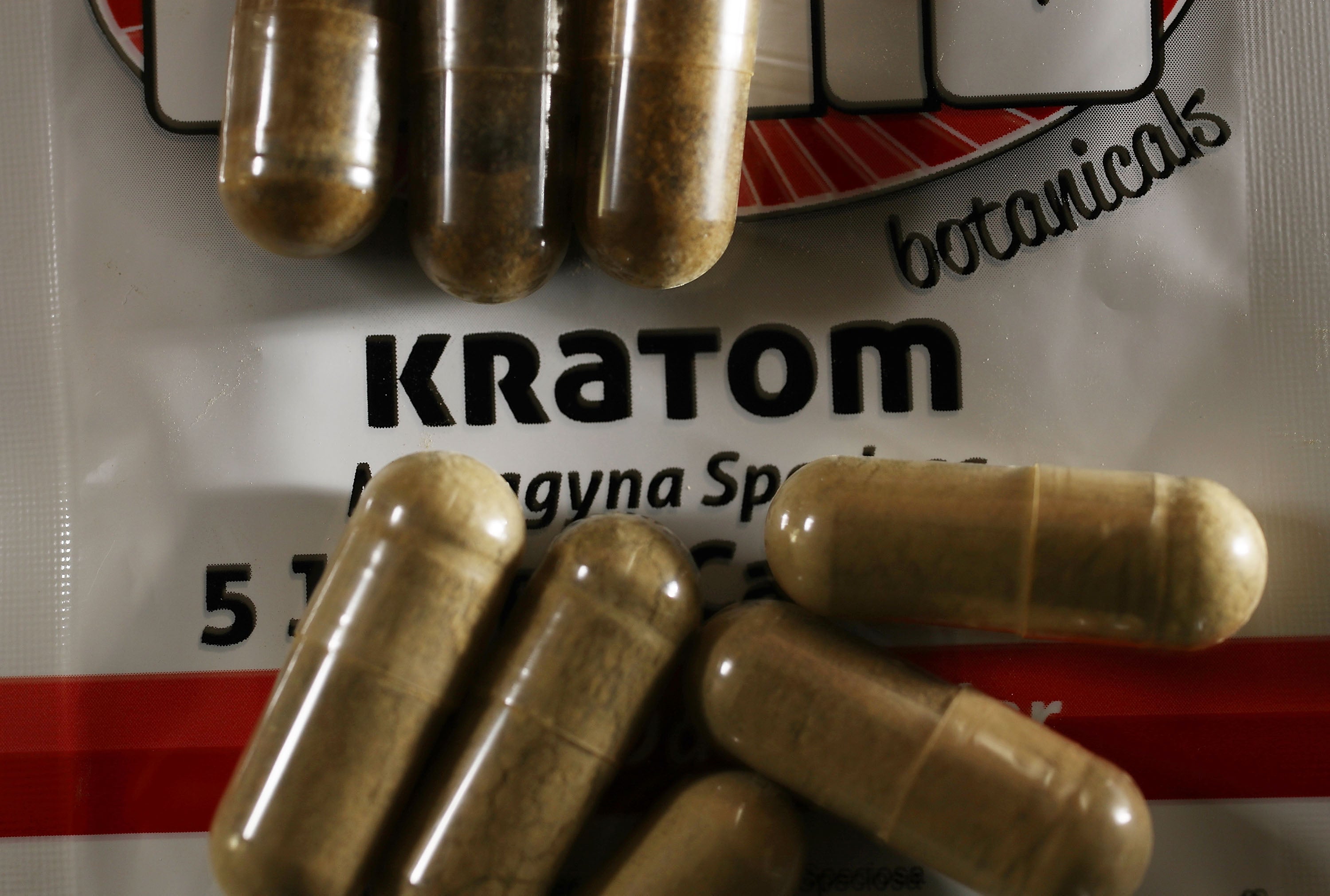California officials have banned the sales of kratom, a popular supplement often used to treat pain and anxiety, after finding it was linked to six deaths in Los Angeles County, but what role the supplement played remains a mystery.
Kratom is a tropical tree native to Southeast Asia; 7-OH is a natural psychoactive component found in kratom leaves in trace amounts. But there’s a growing popularity of concentrated versions — offered as tablets, gummies, and liquid extracts — which are synthetic, according to the FDA.
Neither kratom nor 7-OH are regulated or approved for use in the U.S. as a drug product, a dietary supplement, or a food additive, according to the FDA. In July, the agency issued warning letters to companies that were “illegally marketing products” containing 7-OH.
Since the spring, six people between the ages of 18 and 40 have died after ingesting products containing 7-OH, Los Angeles County Department of Public Health said. The department this month advised retailers to stop selling products that contain kratom and the synthetic kratom compound 7-OH from their shelves.
These products are often marketed as dietary supplements, used to alleviate pain, anxiety and mood disorders, opioid withdrawal, LA County health officials said.
“At lower doses, 7-OH acts like a stimulant and at higher doses, it acts like an opioid. Mixing or using it with alcohol, prescription drugs, or illicit substances can significantly slow breathing and lead to death,” Dr. Muntu Davis, Los Angeles County Health Officer, said in a statement. “The safest choice is to avoid all 7-OH products.”
The county isn’t alone. Some local governments have adopted bans on kratom products and at least six states — Alabama, Arkansas, Indiana, Rhode Island, Vermont and Wisconsin — have banned 7-OH, according to a 2023 report by the Congressional Research Service.
The FDA warned consumers to avoid using kratom “because of the risk of serious adverse events,” such as seizures, noting it has been linked to deaths “in rare cases.” But, the agency noted that in these cases, “kratom was usually used in combination with other drugs, and the contribution of kratom in the deaths is unclear.”
That was true in the deaths reported in LA County this year tied to kratom use. Health officials noted that alcohol, medications or illicit substances were also found alongside 7-OH. Medical examiners’ reports, obtained by the Los Angeles Times, showed the cause of five of the deaths was listed as a consequence of “mixed drug effects.” The sixth death was caused by a cocaine overdose.
Toxicologists told the LA Times that there was insufficient research to show what concentrations of kratom can be toxic when not mixed with another substance.
“I don’t claim to have investigated all the reports about kratom deaths, but I haven’t seen too many reports of single-drug ingestions of kratom causing death,” Craig Smollin, medical director of the San Francisco division of the California Poison Control System, told the paper.
On top of lack of research, the testing methods may not be effective, experts say. There is a test to show how much kratom is in the body, but no such test exists for 7-OH. The existing test merely shows whether 7-OH was present or not, according to the LA Times.
Perhaps further complicating measures, when the body metabolizes kratom, part of the breakdown includes 7-OH, making the compound likely to appear in medical tests alongside kratom, Donna Papsun, a forensic toxicologist at NMS Labs in Pennsylvania, told the outlet.
Testing results may also be complicated because 7-OH is also “incredibly unstable,” Papsun said, noting that while it may be detected at the time of death, in the time that passes until samples are collected, it may have already broken down.

The deaths are “not an easy picture” to unpack, Robert Powers, a forensic toxicologist at the University of New Haven, told the paper, saying he understands why health officials have taken steps to restrict kratom and 7-OH.
“I think it’s reasonable to recognize that in these cases, kratom could have indeed played a contributory role. And I understand the interest in trying to limit the potential effects of this drug in those mixed cases, so I understand why people would be interested in controlling this drug,” Powers said.
But not everyone is supportive of the ban. Consumers and sellers argue kratom products should be regulated.
Dee Macaluso, a 74-year-old who has trouble breathing and suffers from fatigue due to chronic lung illnesses, sought out specialists to try to help her get back to her once-active lifestyle, but nothing they suggested improved her health, the LA Times reported. So she turned to kratom after watching a documentary.
“I didn’t use it very often, but when I did I found that it helped so many of my issues,” Macaluso told the outlet, saying it gave her a boost of energy. Now she relies on it daily.
After the county announced it was going to pull kratom products from the shelves, she recalled: “I told my husband, I don’t know what I’m going to do if I don’t have it and then I won’t be able to get out of bed, or paint or do the little bit that I can do.”
Macaluso educated herself on how to use the products, experimenting with different dosages, and said she thinks the government should allow the public to continue to do so, regulating them, not banning them altogether. “There’s always going to be people that misuse it but I don’t think that those of us who are using it responsibly and getting benefit from it should be penalized,” she said.
Abdullah Mamun, who started the business Authentic Kratom in 2013, told the LA Times that while he understands that 7-OH poses a danger, he says a ban on all kratom products is a mistake.
His customers say his products have helped them manage pain. Mamun supported regulating kratom products: “We want them to be properly labeled for customers because people should know what they’re putting in their body.”
Mexican woman gets 20 years for robbery with violence in surfers' killings
Trump proposes expanding offshore drilling in California and Florida despite risks
Volkswagen debuts restored vintage blue bus that survived a California wildfire and melted hearts
Chiefs coach responds to Trump’s criticism of NFL rule: ‘No idea what’s going on’
Coast Guard disputes claim new guidelines no longer consider swastikas hate symbols
Democrats targeted in Trump’s death threat disappointed over GOP reaction: Live







